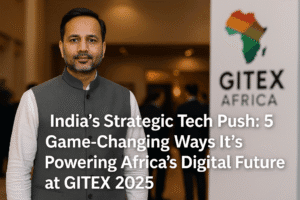India’s Strategic Tech Push: 5 Game-Changing Ways It’s Powering Africa’s Digital Future at GITEX 2025
India emerged as a key player at Africa’s largest tech summit, GITEX Africa 2025, with Minister Jayant Chaudhary championing digital inclusivity and knowledge-sharing as tools for global progress. Highlighting India’s transformative Digital Public Infrastructure (DPI)—including Aadhaar, UPI, and the Skill India Digital Hub—he emphasized scalable solutions for education, healthcare, and economic empowerment.
With a 33% surge in AI talent, India positioned itself as a partner for Africa’s tech-driven development, offering expertise in AI, fintech, and cybersecurity. Bilateral talks with Morocco focused on synergies in digital governance, education, and startup ecosystems, underscoring India’s commitment to mutual growth. Chaudhary’s vision centered on leveraging open-source DPI models and skilling initiatives to empower Africa’s youth, who represent 60% of the continent’s population.
The summit reinforced India’s shift from tech consumer to global innovator, advocating collaborative frameworks to address regional challenges like agriculture and healthcare. By fostering equitable tech diplomacy, India and Africa aim to co-create solutions, reshaping the Global South’s role in the digital economy.

India’s Strategic Tech Push: 5 Game-Changing Ways It’s Powering Africa’s Digital Future at GITEX 2025
Africa’s largest tech and startup summit, GITEX Africa 2025, concluded in Marrakech this week, drawing global attention to the continent’s burgeoning innovation ecosystem. Among the standout participants was India, represented by Minister of State Jayant Chaudhary, who underscored the nation’s commitment to fostering inclusive growth through technology and skill-sharing partnerships.
India’s Digital Public Infrastructure: A Blueprint for Global South Collaboration
At the heart of India’s engagement was its pioneering Digital Public Infrastructure (DPI)—a suite of scalable, open-source systems like Aadhaar (digital identity), UPI (instant payments), and ONDC (e-commerce). Chaudhary highlighted how these tools have democratized access to services for over a billion Indians, offering a replicable model for African nations aiming to accelerate digital inclusion.
“DPI isn’t just about technology—it’s about empowerment,” Chaudhary remarked during a panel discussion. “By integrating AI, cybersecurity, and fintech into frameworks like our Skill India Digital Hub, we’ve onboarded 10 million users in 18 months. This is a testament to how shared knowledge can bridge gaps in education and economic opportunity.”
AI Talent and Skilling: India’s Growing Global Influence
A key takeaway from the summit was India’s emergence as a hub for AI talent. With a 33.4% year-on-year surge in AI professionals (as per the 2025 Stanford AI Index), India’s skilling initiatives are producing a workforce adept at navigating next-gen technologies. Chaudhary emphasized that this talent pool is ripe for cross-border collaboration, particularly in sectors like healthcare, agriculture, and fintech—areas critical to Africa’s development agenda.
Bilateral Talks: Building Bridges in Education and Innovation
On the sidelines, Chaudhary’s meetings with Moroccan officials revealed concrete steps toward partnership:
- Digital Transition: Discussions with Morocco’s Minister of Digital Transition focused on leveraging India’s DPI expertise to enhance public service delivery.
- Education Synergies: Talks with Morocco’s Higher Education Minister explored joint research programs and student exchanges in AI and robotics.
- Startup Ecosystem: Engagement with Morocco’s Economic Inclusion Minister highlighted plans to connect Indian and African startups through mentorship and funding platforms.
Why This Matters for Africa
India’s tech narrative offers actionable insights for Africa:
- Leapfrogging Traditional Barriers: Africa’s mobile-first population (638 million smartphone users as of 2025) could adopt India’s UPI-like systems to bypass legacy banking infrastructure.
- Skilling at Scale: Programs like Skill India Digital Hub (SIDH) demonstrate how digital platforms can rapidly upskill youth—a priority for Africa, where 60% of the population is under 25.
- AI for Local Challenges: Collaborative AI projects could address region-specific issues, such as optimizing crop yields or improving maternal healthcare outcomes.
The Road Ahead
India’s participation at GITEX Africa 2025 wasn’t merely diplomatic—it signaled a shift toward equitable tech diplomacy. By positioning itself as a partner rather than a donor, India is fostering a two-way exchange where African innovations (like Kenya’s M-Pesa or Nigeria’s Flutterwave) can also inform its own digital evolution.
As Chaudhary noted, “The future of growth is collaborative. When we share tools to build DPIs or co-create AI solutions, we’re not just solving problems—we’re reshaping the global economy’s balance of power.”
For African nations, the message is clear: India’s journey from a tech consumer to a tech architect offers a roadmap for harnessing innovation as a force for equitable progress. The next frontier lies in transforming these dialogues into tangible projects—a challenge both regions seem ready to embrace.
You must be logged in to post a comment.